Engaged Anthropology Grant: Chelsie Yount-Andre
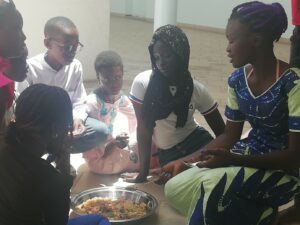
Chelsie Yount-Andre received a Dissertation Fieldwork Grant in 2013 to aid research on “Giving, Taking, and Sharing: Reproducing Economic Moralities and Social Hierarchies in Transnational Senegal,” supervised by Dr. Caroline Bledsoe. Dr. Yount-Andre was then able to build upon her research when she received an Engaged Anthropology Grant in 2018 to aid engaged activities on “Sharing Food, Money, and Morals: Celebrating Children’s Kinwork in Transnational Senegal.”
My Wenner-Gren funded dissertation research investigated how increasing global inequalities reshape the ways families negotiate what I call, “economic moralities,” that is, normative expectations of material obligation and entitlement. I analyzed household discussions that mediate practices of food sharing and gift giving, to shed light on the ways children in Senegalese families in Paris learn to manage the diverse moral expectations they encounter in French society and their transnational families. Focusing on economic moralities that emerged in everyday interaction, my research revealed children’s key role in the reproduction of socioeconomic relations with relatives abroad, shaping the transnational flow of resources.
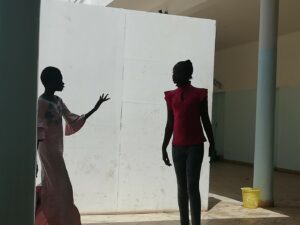
As part of my continued efforts to incorporate the voices of children into discussions about migration, I first organized a children’s theater workshop in Dakar and then presented a film of the youth’s performance at a community meal in Paris. These two events were funded by a Wenner-Gren Engaged Anthropology Grant and the Chaire UNESCO World Food Systems. The projects’ aims were twofold: 1) to promote mutual understanding among kin in Senegal and France by shedding light on the moral and material pressures transnational relatives face, and 2) to publicly highlight the value of immigrants’ eating and economic practices in France.
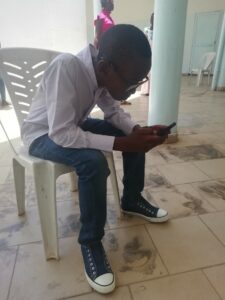
The children’s theater workshop, organized in collaboration with the Kàddu Yaraax theater troupe, was held April 26-27, 2019 at the Centre Culturel Blaise Senghor in Dakar. Twelve children (aged 8-16) spent the weekend acting out scenes that depicted the confusion and frustration that Senegalese children growing up in Paris experience when they visit their families in Dakar, where they encounter new expectations regarding how they “ought” to give and share. Transcriptions of three stories that Senegalese children in Paris had recounted during my dissertation research provided the starting point for the workshop. Youth in Dakar embodied the positions of children growing up in France in stories of perplexing interactions surrounding material exchanges, such as a boy’s trip to Dakar when his father invited his Senegal-based cousins to choose whatever they wanted from his son’s suitcase while the boy was away at the beach.
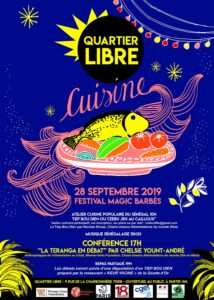
The youth collaborated to co-construct a short performance, combining the three stories and adding details of their own, based on anecdotes they shared of their own interactions with cousins who visited from Europe. Working through these scenes, the youth in Dakar struggled to understand what children growing up in France may and may not know about life in Senegal. For example, as they enacted a scene in which a girl from Paris did not understand that a griot singing her praises expected her to give money, the youth in Senegal were shocked to realize that the girl had never encountered griots in France. Through these discussions, youth came to realize that many actions they had previously associated with selfishness and greed could simply be the result of youth from France’s ignorance of everyday practices in Senegal.
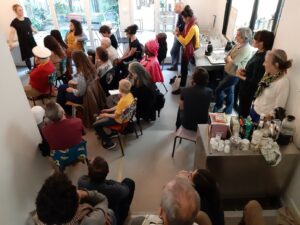
The performance culminated with a mealtime scene in which the children explained how giving and sharing take place in Senegal, using the metaphor of eating around a communal dish. The workshop ended with in a performance for the children’s families and community in Dakar. Through children’s voices, the event presented messages also important to Senegalese adults, countering stereotypes of selfish migrants who raise spoiled children. The entire workshop was filmed and edited into a 15-minute video that presents the tensions with which transnational families struggle and the cultural values that organize food sharing and material support in Senegal.
I then brought the film back to Paris to present at a community meal on September 28, 2019 at the “Quartier Libre,” cultural center in the African neighborhood, Goutte d’or. This event was part of the association’s contribution to the Magic Barbes Festival, a celebration of the diverse immigrant cultures in the neighborhood. Working with the 4C association, we organized a full-day celebration of Senegalese and African culture in France, beginning with a cooking workshop where participants learned to make Senegal’s national dish, ceebujenn. This was followed by a performance of kora music and the day ended with a presentation and discussion of my research and the film of the theater workshop in Dakar.
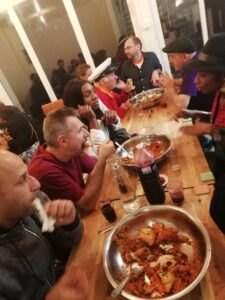
Before showing the video of the children’s performance in Dakar, we first presented the original transcriptions of the three scenes that had provided the basis for the workshop. These scenes were graciously read aloud by Mengué Lett and Dr. Souleymane Gassama, members of the Senegalese community in Paris who played integral roles in my research. We then projected the film from the workshop in Dakar to an audience which included the Paris-based family members of workshop participants, members of the families who participated in my dissertation research, and members of the public who were present for the Magic Barbes Festival. The screening was followed by discussion and debate, facilitated by Christine Tichit, a sociologist at the French National Institute for Agronomic Research (INRA) whose work focuses on youth, food, and migration in France.
As they sat and ate ceebujenn around a communal dish, event participants in Paris were able to embody the perspective of those in Senegal, gaining insights into the ways that food sharing and material support take place in West Africa. Celebrating the value of these practices, this project worked to destigmatize immigrants’ economic choices and eating habits, which my research participants often complained were treated as irrational or uncivilized in France. By publicly celebrating West African eating practices and the economic links they symbolize and create, this project demonstrated to immigrant families in Paris the community interest and respect for their practices in France.